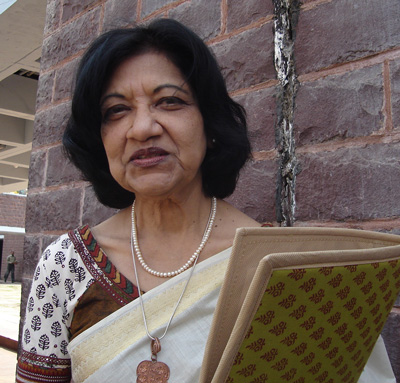

When I separate the positive inputs of Mridula Garg's life from the stumbling blocks, I find they are the same. She was a sickly child, which meant missing school, games and having friends. The positive aspect was that it pushed her from action to reflection. It was a short step to literature, reading then writing. Thanks to her father, who thought that someone on the brink of death should read the masters, she read Tolstoy, Dostoevsky, Chekhov, Henry James, Shakespeare, Jainendra, Rabindranath Thakur at an early age. She added popular writers like Maugham, Oscar Wilde, Graham Greene, P.G. Wodehouse, Jane Austen as she went on. Not going to school for three years helped her concentrate on out-of-course books. It also made her lose the fear of eminence, so she could look the most famous man in the eye and discuss his work candidly.
She did not suffer the deprivation of a girl child. They were five sisters, three of whom became writers. Her mother was neither a career woman nor a good housekeeper or mother, being a chronic invalid. But she was an avid reader of literature in three languages, Hindi, English and Urdu, which bolstered Mridula's love of reading. The lack of maternal care had a positive effect. Mridula cherished her mother for being different, which later helped her shape the non-stereotypical women characters in her novels and stories. When the orthodox Hindi world said they did not ring true as Bhartiya narees, she ignored them, secure in the knowledge of the nonconformist women of her family.
 Life without a presiding mother figure was difficult but never dull or predictable. Ironically she married into a family that was
all her parental family was not, down to earth, unimaginative, conformist. Her intense loneliness in the midst of a large family
pushed her into creative writing. What started as an escape soon turned into a passion.
Life without a presiding mother figure was difficult but never dull or predictable. Ironically she married into a family that was
all her parental family was not, down to earth, unimaginative, conformist. Her intense loneliness in the midst of a large family
pushed her into creative writing. What started as an escape soon turned into a passion.
If challenge is the force behind creativity, Mridula was well-provided. Each bout of criticism by patriarchic critics gave her fresh reasons to write in her inimitable style.
Her story Avkaash (1972), in which a woman having an extra marital affair says, 'all she wants is a vacation,' was the first to earn their ire. A mother of two and an affair, impossible in Bharatvarsh! As if children were amulets against lust! The thin-skinned reaction was not peculiar to the Hindi world. Adil Jussawala, reviewing a collection of her translated English stories Daffodils On Fire (1991) said, "Aversion, an understated story about a woman who has quietly gone mad and refuses to acknowledge the presence of her retired husband, is Garg at her best." A classic case of killing with kindness! The woman was anything but mad. Poised and competent, she did not communicate with her husband because she did not care to. He went on to say, "Garg's protagonists are frequently urban women suffering from the disorders women writers authoritatively keep telling us urban women suffer from," and to which they turn a blind eye. Garg forced them to open their eyes. Being misread deepened her sense of the absurd and honed her satirical skills, which she used with searing frankness in her later novels and stories. She came to be known as much for the audacity of her themes and the lyricism of her style. She broke new ground with form and content in her early stories like "Kitni Qaiden", "Hari Bindi", "Daffodils Jal Rahe Hain", and novels like Uske Hisse ki Dhoop and Chittacobra in the Seventies. She was not averse to using new forms to suit the diversity of her themes. They vary from suspension of female guilt in Uske Hisse ki Dhoop and Chittacobra (1975 and 1979), the throttling hold of the joint family in Vanshaj (1976), the passionate interplay between the personal and the political turmoil in Anitya (1980), the conflict between creative genius and human instincts and emotions in Main Aur Main(1984),the male/female confrontation and its final resolution in the concept of ardhanaris'vara in Kathgulab(1996) to the auto-fiction set in the age of innocence of our nation in the latest Miljul Man(2009).
 She was arrested in 1980 for her novel Chittacobra on charges of obscenity, because her female protagonist dared to indulge
in cerebral reflection during sexual intercourse. The establishment could not digest the admixture of sensual and cerebral
averse as it was to people, particularly women thinking for themselves. She continued writing undeterred. In fact she wrote and
published Anitya in the same year.
She was arrested in 1980 for her novel Chittacobra on charges of obscenity, because her female protagonist dared to indulge
in cerebral reflection during sexual intercourse. The establishment could not digest the admixture of sensual and cerebral
averse as it was to people, particularly women thinking for themselves. She continued writing undeterred. In fact she wrote and
published Anitya in the same year.
Memory of the past plays a highly significant role in Garg's novels, particularly in Anitya and Kathgulab. She expects her reader to have a long memory as frequent flashbacks make forays into personal and collective memory that flow into the present in a continuous stream of consciousness. Anitya occupies a special place in Garg's oeuvre. She was nine year old in 1947, so had enough memories of the period before Independence, the earliest being of the Quit India Movement of 1942. The novel is a product of the dilemmas, dissentions and doubts that underlined the various Independence movements. Anitya is unique in the way it juxtaposes the personal and political to elucidate Sartre's axiom, 'I am my choices.' The protagonists are lost in a maze of choices, picking the wrong way out, so that they end up incarcerated in increasingly narrower spaces, while striving for freedom. They have only themselves to blame because each had made the choice himself.
The reader is drawn in a vortex of political and personal turmoil where memory and present experience blend to create an intense,
enticing and thought provoking novel, which despite a wealth of historical material is not a requiem for the dead past.
Freedom of choice is a hard taskmaster. It is not easy to be free but it sure is exhilarating, that is the credo running
through Garg's writing.

